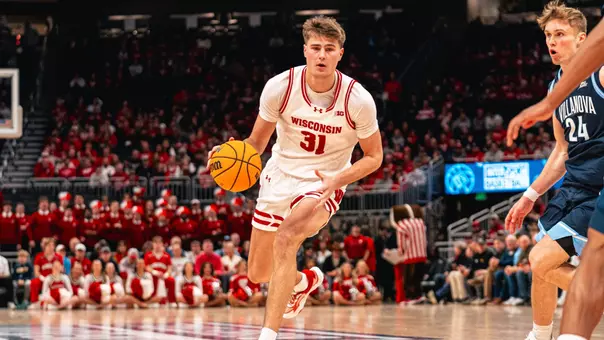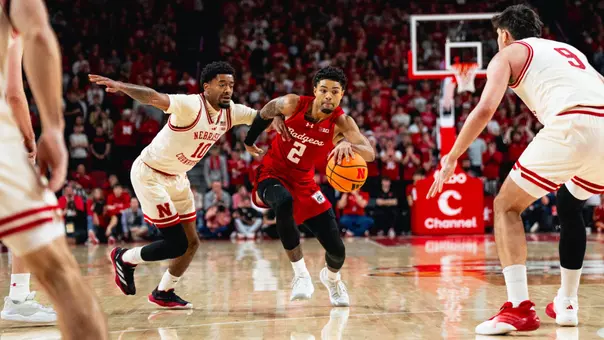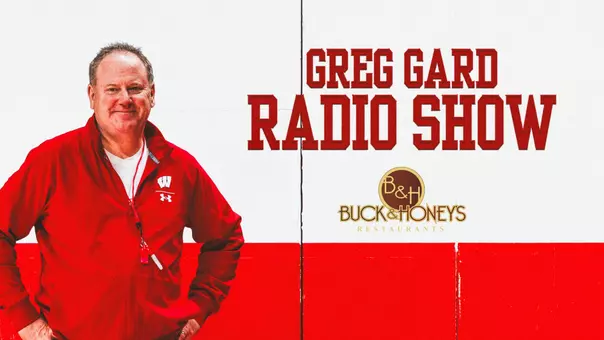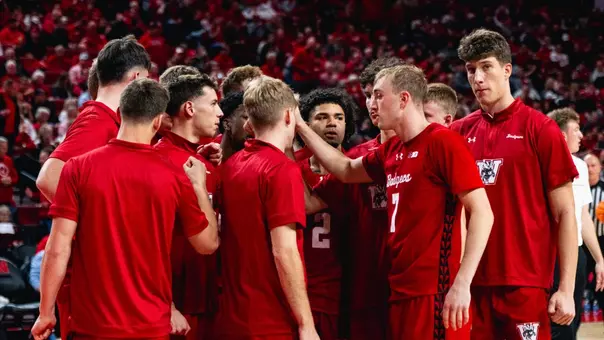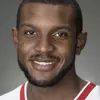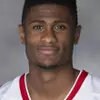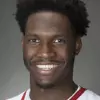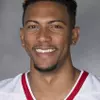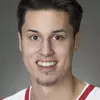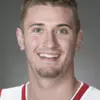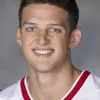Badgers share dedication, diplomas in common
May 11, 2017 | Men's Basketball, Mike Lucas
Products of program’s classroom culture, distinguished men’s basketball class graduates together
By: Mike Lucas
 |
||
|
BY MIKE LUCAS
UWBadgers.com Senior Writer
MADISON, Wis. — The 115 victories and back-to-back Final Fours will distinguish them.
"A lot of it's glorified," Nigel Hayes suggested, "and rightfully so with the basketball."
Putting themselves in position to graduate will define them.
"We also did good things in the classroom," said Hayes, "and were able to get a degree."
Hayes, Bronson Koenig, Vitto Brown, Zak Showalter and Jordan Hill are getting to the finish line together as Wisconsin student-athletes. All but Showalter were part of the 2013 recruiting class, which also included Riley Dearring, who transferred, and walk-on Aaron Moesch, who will return as a fifth-year senior. Showalter arrived on campus in 2012 with Sam Dekker and redshirted as a sophomore in '13.
Showalter is still friends with Dekker, who's completing his second season in the NBA with the Houston Rockets. Dekker, who left school after his junior year, turned 23 on Saturday and Showalter wished him a happy birthday via Twitter. Wish I could be down in Houston to celebrate, Showalter's tweet read, but I'm STILL in college trying to get this degree.
"Leaving @UWMadison, I feel..." This week, we say goodbye to a number of our Badgers as they become a UWGrad.
— Wisconsin Badgers (@UWBadgers) May 8, 2017
Last Saturday, Showalter had two final exams. He took 12 credits this semester though he needed only nine to graduate. Why do the extra work? "There was a professor I really wanted to take a class with," explained Showalter, who has a double major in finance and risk management. He likes to speak of UW's basketball culture in terms of, "We've got guys who want to learn and are passionate about it."
Hayes has embraced that passion since his mom rewarded him for exemplary marks in elementary school. He got $2 for every "praise-worthy" on his report card — "satisfactory" wasn't good enough. Later, he cashed in on As. "My mother eventually got tired of giving me money," he said. "But something kind of stuck with me. I always had the desire to do well in school."

Talaya Davis wanted that for her son. But she also wanted Nigel to want it for himself.
"No matter how good you are in basketball — the best player of all time — you can only play for so long and you'll need to rely on something else and that's where your degree comes in," said Hayes, reciting her every word. "She did a good job of instilling priorities and giving us time-management skills — knowing what you want and the sacrifices that needed to be made in order to do it."
Brown had similar motivations at home during his teen years. "It wasn't heavily stressed," he said of getting a college education, "because it seemed to be kind of an expectation, if you will. My mom has two masters and my dad has his PhD and we all expected to go to college — me, my older brother, who has graduated, and my little sister coming after me. We all knew it was important."
Hayes and Showalter were both Academic All-Big Ten honorees in the UW business school. Koenig and Brown were life sciences communication majors. Hill, who redshirted as a sophomore, will get his degree in retailing and consumer behavior. As a graduate transfer, he will use his final year of eligibility at Seattle University, a Division I program in the WAC. All five players bonded in the locker room … and the classroom.

"The fact that we all had academic backgrounds and knew different things, we were able to share those things and kind of grow and learn as a unit," said Brown. "Academically, we were able to get things done together in different classes. If someone had expertise in one area — and someone else in another — we never hesitated to call each other on that."
And now they can see the finish line.
"It will be very special knowing we all came in together and we persevered through the ups and downs," Brown said. "Obviously, we've all had different careers. But at the end of the day, we're going to be sharing this one commonality — which will be the fact that we'll all be graduating and holding these diplomas in our hands. It will definitely be a special moment, a proud moment for us."
The best of the best for 2017 Achievement of the Year #OnWisconsin || #Badgers
— Wisconsin Basketball (@BadgerMBB) April 26, 2017
Hayes figures that his diploma will be worth more than $2.
"A degree means different things to different people," Hayes said. "Some people are the first ones in their family to graduate. Some people are getting the same degree their great-grandfather got — he was a doctor and they wanted to fall in line by being a doctor. Or some people are getting their degree because they made a promise to other people to do it."
What about Hayes who majored in business finance and investment banking?
What will the degree mean to him?
"For me, it's showing that I was able to stick with something," he said. "That's essentially what college boils down to. Can you be dedicated for four years? And, then, they hand you a piece of paper that says, 'Yes, you were dedicated for four years.' It's knowing I put the time in and made the effort to stay on top of things to graduate."

Showalter reiterated a point that he made earlier. "Speaking for the basketball team, we have a lot of guys who wanted to learn and wanted to better themselves in every way possible," he said, adding the academic environment has been conducive to personal growth. "Being around people who are very dedicated, pretty inspiring people, opened my eyes to what is all out there." Post-hoops.
Individually, they received direction and support from the UW Office of Academic Services, namely Mary Weaver-Klees, the associate director; and Tracey Maloney, a learning specialist, "They've been instrumental when it comes to making sure my head was always on straight — helping me if I slipped at some point," Brown said. "If I needed any bit of guidance, they were always there."
Added Showalter, "The guys that they're spending less time with are usually the guys that are taking care of their work, so sometimes you don't want to have that phone call from Mary or Tracey saying, 'Hey, take care of this.' But, at the same time, those are the things that allows this program to continue to reach high academic standards — it's their constant desire to help us learn."
The campus resources were there. So was the help. All they had to do was ask.
"Personally, I didn't have a problem with asking for help," Hayes said. "I don't have a large ego in saying, 'I don't know something' or 'I need help with school.' With all the resources we have available, if you're failing something, it's probably because you're trying to fail. There's too much help, too many people who are here specifically to help you succeed in your student-athlete endeavors."
Said Brown, "Some people may think they don't need help — pride-wise — because they didn't need help in high school. Or they may be embarrassed by it. But it doesn't take very long, after that first test or two, when you realize how hard this actually is and you'll definitely take all the help you can get. As I figured things out, I didn't need as much. I don't think I had a tutor since my sophomore year."
They've all heard it. The dumb jock stereotype. Or have they? "Honestly, not really," Showalter said. "I've spent most of my time in the business school and I think a lot of my classmates see the effort that we put forth. We're not just sitting there not trying to pick up the information. We're actually engaged and trying to do our best to pick it up even though we might miss a few more classes than other students."
On the other hand, Brown – another Academic All-Big Ten selection – has been around a few people who are into "dumb jock" labeling. "Usually, they know better than to say it right to your face," he said. "If it did come to that, I wouldn't hesitate to call them out and let them know, 'First off, my grades are probably better than yours and I'm doing way more stuff than you.' But you really can't get caught up in that. People are going to say what they want to say, whether it's about your game or your academics. There are always criticisms out there. That's another thing about college. It allows you to mature through those things. You learn how to sift out the negative talk — not getting caught up in that — and keep moving forward."

So, moving forward, what comes next?
In early April, Showalter took part in the three-on-three national tournament at the U.S. Olympic Training Center in Colorado Springs. His agent got him on the 3BALL Selects, one of the competing teams. "It's very different, very high-paced — it's awesome, I love it," he said of the half-court competition featuring three players to a side and 10-minute or first-team-to-21 games (made baskets outside the arc are worth two points versus one point inside the arc). "It's supposed to be an Olympic sport in 2020."
Showalter was asked to play in another three-on-three tournament this weekend in Chicago. "But I turned it down so I could be here and walk with my fellow classmates for graduation."
For a second consecutive year, Hayes will participate in the NBA's draft combine in Chicago. Players will be evaluated five-on-five, tested for strength and agility, and interviewed. "I know a lot of the things that will be going on and I know what's expected and everything that is supposed to happen," Hayes said of the combine that will run Tuesday through Saturday at Quest Multisport. "I'm still going to graduation and I think they will do a good job of accommodating me."
Good luck to @NIGEL_HAYES this week at the #NBACombine. Details on how you can keep tabs and watch him.
— Wisconsin Basketball (@BadgerMBB) May 9, 2017
Hayes has been training in Santa Barbara, California. From the start, he has kept professors and advisors in the loop. "Even before the Big Ten tournament, I filled them in and had meetings with all of them and let them know my situation and what I was going to be doing and the timetable for everything," he said. "They were very good in allowing me to do some work early, and some work later, and move things around so I could still get all of my work in and finish my classes and graduate."
That is nothing new for any of the graduating Badgers.
On the sacrifices student-athletes make, Hayes said, "You have to be willing to do things you probably don't want to do at a particular time. But you know it's something you have to do and we learned that through basketball. There are times in the morning where we don't want to get up at 6:30 for a 7 o'clock lift. But we know it's something we need to do if we want to accomplish our goals. It's the same way with school. We want to pass classes. We want to finish school. We want to get our degree. Even though I'm sore after having played a game and getting back at 2 a.m., I have to get in the training room with Henry (Perez-Guerra) that next morning. And as he's doing rehab on my body, I'm sitting there with an iPad studying for an exam that I might have in a couple of days."
That's a reflection on the culture of learning that permeates the basketball program.

"That's the beauty of Wisconsin," Brown said. "You can't say that about every school — that they place so much emphasis on academics. We knew here that it was important because the ball will stop bouncing at some point. And, obviously, it's always better to have that education. That was something that was stressed since Day 1 walking on to this campus and it has been stressed throughout my whole career."
On the advantages of being a student-athlete, Hayes said, "Basketball has allowed me to travel and do a lot of great things and meet a lot of great people. I've been able to use basketball and the platform that I've created with all of my hard work to do a lot of good things as far as community service and standing up and speaking out on topics.
"It gives you a bigger voice in the world and allows you to have more of an impact on things."
An impact that will be obvious any time these graduates see their diploma hanging on the wall.
Over $1 million raised? Not bad for a debut. #GardingAgainstCancer
— Wisconsin Basketball (@BadgerMBB) May 6, 2017

